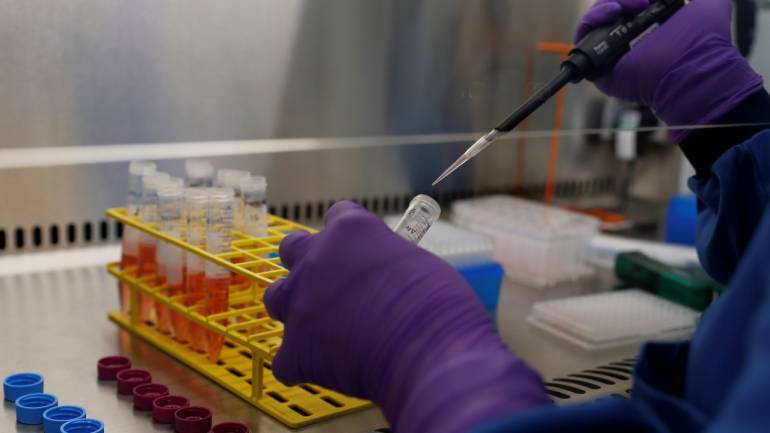IMA-PG India is on the frontlines of COVID-19 with its pharma industry machinery like blister packing machines, tube filling machines and tablet counting lines.
At a time when the Indian pharma industry is in the eye of a global storm with novel coronavirus, or COVID-19, IMA-PG India is on the frontlines with its pharma industry machinery like blister packing machines, tube filling machines and tablet counting lines. A 100 percent subsidiary of IMA Spa, Italy, the company has manufacturing facilities in Maharashtra and Madhya Pradesh.
In an interaction with Moneycontrol, Bhavin Ashar, Finance Director at IMA-PG India, takes a few questions on the impact that COVID-19 has on his work. Much of Ashar’s professional career has been in the pharma industry or companies with links to pharma. He finds both finance and pharma interesting. “Finance gives an opportunity to collaborate with business and translate business results into numbers. And pharma and related industries have good challenges, which require disciplined and systematic plans," he said.
Edited excerpts:
A: Yes, it was necessary to continue it, whether you like it or not. It is easy for cases to multiply. Yes, there will be an economic hit.
A: Yes, it is busy as well as challenging time both. We have plants in both Maharashtra and Madhya Pradesh. In both places there are significant COVID-19 cases. Since we have limited approvals, we are working with 10-15 percent of our workforce with all the standard operating procedures. We supply blister packaging machines to pharmaceutical companies and are learning the new way of working in the current situation.
Q: What has changed for you and your company?A: I think COVID 19 has changed the way we look at everything. As we are in the machine building industry, it was always ‘on-the-workshop/floor’ kind of a job. Customers would also visit us at the factory multiple times for testing. However, with COVID-19, we are attempting a new way of working. We are focussing on testing through shared videos and testing through the electronic mode. Certain functional teams are working from home. And I think that we will find ways to keep operations running smoothly.
Q: Are you looking at cost-cutting measures?A: Yes, though right now our priority is to assure customers that we are there for them. That we will deliver what is needed once the lockdown ends. The year 2020 is going to be a wash-out. We have reworked on our forecasts. I personally do not see any scale up in operations till June-end or so. And by the time things start finally returning to normalcy, it could be November or December. We are looking at the offices which are lying unused right now and are wondering whether we need them at all.
Q: So work from home is being accepted even in the manufacturing sector?A: Yes, it has already been accepted. I have worked in diverse organisations, with revenues ranging from $2 billion to $20 billion. Some were quite accepting of the work-from-home flexibility. Others used to think that in manufacturing even finance cannot work from home. All that resistance has been worn down now.
Q: Do you see a reconfiguration of global supply chains out of China as a result of the coronavirus? Or do you think that China is too well entrenched to lose its status as the factory of the world for a long time to come?A: As a result of COVID-19, everyone must have realised that too much dependency on one centre i.e China is not good. Various countries will come together to see these changes and that the supply chain is redefined. This will open up the opportunities for other countries.
Q: Despite its advantages, India is still not being spoken of (at least in global media) as a natural successor to China in this supply-chain reorganisation. Why do you suppose that is the case?A: Well, I personally believe that India has a really good opportunity (to claim that space). However, there are (inherent) challenges with India. Though ease of doing business has improved, on the ground there are glitches still. The permissions, processes and overall bureaucracy are so complicated that India is still not on radar.
Today, most of the withdrawal from China is benefitting Vietnam and other Asian countries.
On the tax front too, India did not have a good image internationally. Mainly, lack of clarity in taxation and due to retrospective amendments. Of course, in the recent past there has been an attempt to deal with this to a certain extent.
Q: Are you happy with the way tax refunds are proceeding?A: It’s better than in the past. However, corruption is not yet fully extinguished in such areas.
Q: So what are the urgent steps that need to be taken in the next 12-18 months in your view to ensure that India lives up to its promise as least in the pharma sector?A: India’s economy had challenges before COVID-19 came along. It was not in the best shape earlier too. The incidence of COVID-19 has just put more pressure on the economy.
Radical changes are required to deal with the situation. Reforms, particularly in the financial sector to deal with non-performing assets, are required. As far as the pharma sector is concerned, it would be great if capacities and capabilities are created on the API (active pharma ingredient) side, particularly on the key starting material (KSM) where India is dependent on China. Of course, it’s an innovation and research-driven industry, so more budget allocation for research would be welcome.First Anniversary Offer: Subscribe to Moneycontrol PRO’s annual plan for ₹1/- per day for the first year and claim exclusive benefits worth ₹20,000. Coupon code: PRO365














